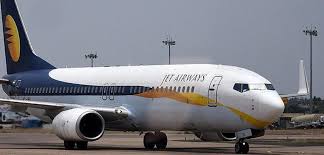“Jet Airways to Be Liquidated as Supreme Court Rules ‘No Choice’ Due to Unpaid Dues”
In a final blow to the hopes of reviving Jet Airways, the Supreme Court on Thursday ordered the liquidation of the airline, effectively ending its chances of a resolution under the Jalan-Kalrock Consortium (JKC). The decision marks the culmination of years of legal and financial setbacks that have left the once-prominent carrier grounded since April 2019.


In a final blow to the hopes of reviving Jet Airways, the Supreme Court on Thursday ordered the liquidation of the airline, effectively ending its chances of a resolution under the Jalan-Kalrock Consortium (JKC). The decision marks the culmination of years of legal and financial setbacks that have left the once-prominent carrier grounded since April 2019.
The court invoked its powers under Article 142 of the Constitution, citing “extraordinary” circumstances that justified overriding a tribunal’s previous decision to approve a resolution plan for the airline. Under the plan, ownership of Jet Airways was to be transferred to JKC, a consortium led by Murari Jalan, a UAE-based non-resident Indian, and Florian Fritsch, a shareholder through Kalrock Capital Partners Limited. However, the plan was marred by significant delays and the failure of JKC to meet the financial obligations outlined in the agreement.
Court Cites “Peculiar and Alarming” Circumstances
The Supreme Court, in its ruling, noted the “peculiar and alarming” circumstances surrounding the implementation of the resolution plan, which it deemed was not being properly executed. Chief Justice DY Chandrachud, along with Justices JB Pardiwala and Manoj Misra, expressed that the court had “no choice but to send Jet Airways into liquidation,” as the resolution plan was no longer capable of being implemented due to non-payment to creditors.
The court emphasized that liquidation should be seen as a last resort for creditors and stakeholders, but given the circumstances, it was now the only viable option. The ruling was a blow to creditors, workers, and other stakeholders who had hoped for a revival of the airline through the resolution plan. However, the court stated that liquidation would best serve their interests in this situation.
Controversial Decision by NCLAT
The judgment also took aim at the National Company Law Appellate Tribunal (NCLAT), which had earlier upheld the resolution plan and cleared the transfer of ownership to JKC despite the consortium’s failure to meet the payment requirements. In particular, JKC had failed to pay an initial ₹350 crore as stipulated under the resolution plan, and overall, was required to pay ₹4,783 crore to settle the airline’s dues.
On March 12, the NCLAT had cleared the resolution plan, but this was immediately challenged by creditors, including the State Bank of India (SBI) and Punjab National Bank (PNB), who argued that the dues remained unpaid. One of the primary concerns was the non-payment of the ₹350 crore, which was a critical condition for the transfer of ownership.
The Supreme Court, in its ruling, upheld the creditors’ concerns, ruling that the ₹200 crore already infused by JKC into the company was to be forfeited. It further directed the NCLAT’s Mumbai bench to appoint a liquidator to begin the process of winding down the airline.
The Struggles of Jet Airways
Jet Airways, once one of India’s largest airlines, was grounded in April 2019 due to a severe financial crisis, which included mounting debt, cash flow issues, and mounting losses. In 2021, after nearly two years of being inoperative, the Jalan-Kalrock Consortium successfully bid to take control of the airline, offering a resolution plan that would have seen the airline’s revival.
However, the process has been fraught with delays. There were issues in meeting financial deadlines, and in May, Jet Airways announced a further delay in declaring its financial results for the year ending March 2022, citing the need for the monitoring committee to review the data. These delays were compounded by the COVID-19 pandemic, which further strained the airline’s prospects for recovery.
Conclusion: A Bitter End to a Long Struggle
The Supreme Court’s decision to order the liquidation of Jet Airways signals the end of a long and troubled journey for the airline, which once symbolized India’s burgeoning aviation sector. The ruling marks a difficult chapter for the creditors and employees who were hoping for the airline’s revival under the new ownership of JKC.
As the liquidation process begins, the future of Jet Airways’ assets, including its fleet and valuable slots at airports, will be determined. This decision underscores the growing challenges of resolving insolvency in the aviation sector and highlights the complex interplay of financial obligations, legal processes, and corporate governance in large-scale business turnarounds.
Sources By Agencies







